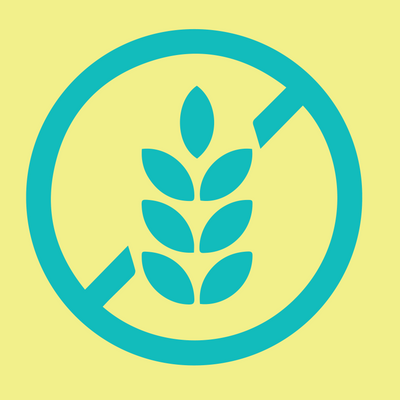digestion
Why is Everyone Gluten-Free Now?
The Plug Drink

The Plug Team

Did you know that the gluten-free market is projected to become a $15 billion industry by 2032 (1)? With "GF" labels popping up on menus and food labels everywhere (including our own!), you might be wondering why gluten-free diets have become so popular.
As statisticians trace the skyrocketing demands for gluten-free products back to the start of the COVID-19 pandemic, this diet is still relatively new to the mainstream health and wellness scene. Interestingly, studies show that the majority of people who purchase gluten-free food products are not diagnosed with a gluten intolerance (2). So, who really needs to eat gluten-free, and is it the right diet for you?

What Even Is Gluten?
Believe it or not, gluten is actually a protein. It occurs naturally in wheat, rye, barley, and triticale, though it can be extracted, concentrated, and added to other foods. This process is typically done to add protein, texture, and/or flavor. In processed foods, this protein can serve as a binder to help hold and shape the food (3).
The protein-based nature of gluten is what allows for the creation of fluffy baked goods. When flour is moistened and kneaded, its gluten molecules become activated, elongating as their protein chains literally stretch out. This elasticity – when combined with a leavening agent (like yeast or baking soda) – allows the dough to rise. Once the dough is baked, the inflation sets as the dough solidifies, which gives the final product its firm structure (4).
Why Do People Go Gluten-Free?
For most people, gluten poses no problem. However, some individuals have a gluten sensitivity, meaning that their bodies react negatively to gluten consumption. Like any other protein, our bodies access enzymes to break down gluten. Protease – a key protein-processing enzyme – helps in the digestion of gluten, but it cannot fully break it down. Any gluten that remains undigested is harmless to most individuals, as it simply continues through the remainder of the digestive tract (3).
However, in some people, the consumption of gluten results in a severe autoimmune response. Rather than digesting the protein molecules normally, their bodies identify gluten as a toxin and attack it. The resulting inflammation leads to symptoms that can range from mild (fatigue) to severe (intestinal damage).

There are a variety of conditions that can result in gluten intolerance, such as celiac disease, gluten-sensitive enteropathy, gluten ataxia, wheat allergies, and dermatitis herpetiformis (DH). For individuals with these conditions, a gluten-free diet is a necessity to prevent medical issues and emergencies (5).
Should I Go Gluten-Free?
The decision to abstain from gluten can depend on various factors, and ultimately it is within every person’s authority to determine which foods they do and do not eat. Generally speaking, gluten is only problematic if a person is diagnosed with one of the specific conditions listed above. As every individual is different, it is always best to speak with your healthcare provider if you have any concerns about your gluten intake.
Harvard University maintains that there is no data that reflects that the elimination of gluten from the diet of a person without a gluten intolerance results in any health benefits (5). While a person may follow whatever diet they so desire, opting for gluten-free foods purely out of the pursuit of better health is scientifically a pointless venture. You can find or create a relevant wellness plan that solely focuses on improving your health for the better rather than just following any diet that may not be beneficial for you. Diets are not a one-size-fits-all type of situation.
Finding the Right Diet for You
Navigating the diet scene can be a confusing pursuit, and we at The Plug are here to help provide straightforward, no-nonsense answers for you. That’s why you can always expect transparency, simple ingredients, and peace of mind from us.
In addition to crafting a formula that is intentionally gluten-free for any consumers with a gluten intolerance or sensitivity, The Plug totes two additional certifications: Plant-Based and Non-GMO Project Verified. Whatever your dietary needs, our proprietary formula aims to make liver care accessible for all.

Bibliography
1. Gluten-Free Products Market to Reach USD 15.1 Billion by 2032; Growing Demand for Gluten-Related Dietary Preferences to Propel Growth [Internet]. Yahoo! Finance. 2023 Dec 18. Available from: https://finance.yahoo.com/news/gluten-free-products-market-reach-080000865.html?guccounter=1&guce_referrer=aHR0cHM6Ly93d3cuZ29vZ2xlLmNvbS8&guce_referrer_sig=AQAAAJUFosohCWv0sK7ni92XqEb8iYr9UbYPBDRcOlCnomDlqR4nSai3O1wTHuGDhlhQgUS1IDagyAzhVGRz1wB5dMUufgIhaNbRpTlp7XagqHtKXUQLP1GdVT1ZhiVSfdHdbs4k-LVJLCWIplVfdGgSwswc7fWTIGccs2hULT74lCqj
2. Non-celiacs drive gluten-free market growth [Internet]. Mintel. 2014 Nov 21. Available from: https://www.mintel.com/insights/food-and-drink/gluten-free-consumption-trends/
3. Rajagopal S. What Is Gluten and What Does It Do? [Internet]. Johns Hopkins Medicine. Available from: https://www.hopkinsmedicine.org/health/wellness-and-prevention/what-is-gluten-and-what-does-it-do
4. Alfaro D. What Is Gluten? A Guide to Understanding Gluten [Internet]. The Spruce Eats. Updated 2022 Sept 21. Available from: https://www.thespruceeats.com/what-is-gluten-995123#:~:text=Gluten%20molecules%20are%20activated%20when
5. Gluten: A Benefit or Harm to the Body? [Internet]. The Nutrition Source | Harvard T.H. Chan School of Public Health. Available from: https://nutritionsource.hsph.harvard.edu/gluten/
